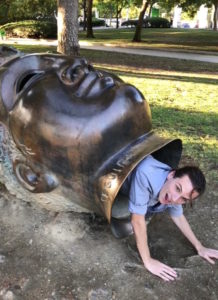A Stranger in a Strange Land
This past fall I spent four months in the Iberian Peninsula attending La Universidad de Sevilla. I lived in a Spanish dorm with three Spanish roommates, ate exclusively Spanish cafeteria food, and took the majority of my classes in Spanish. Amazing, right?
 Well, mostly. I had never visited a Spanish country, and it had been nearly five years since I had taken a Spanish language course before arriving abroad. I had, typical to me, fool heartedly decided that I’d be “able to hang” despite having tragically minimal language skills.
Well, mostly. I had never visited a Spanish country, and it had been nearly five years since I had taken a Spanish language course before arriving abroad. I had, typical to me, fool heartedly decided that I’d be “able to hang” despite having tragically minimal language skills.
As any reasonable person might have guessed, things did not turn out as smoothly as I would have hoped. Adjusting to a new culture, language, and home life was really difficult. During the first few weeks, I found myself feeling confused, isolated, and homesick. Luckily, I am naturally outgoing, had a strong support system through my program, and happened upon some verifiably amazing Spaniards to help me along the way. As often seems to happen, what felt like a near disastrous decision became an incredible opportunity for growth and ultimately turned out to be three of the best months of my life.
The Power of a Friendly Hand
Although I definitely worked hard to learn and create opportunities for myself, the largest share of credit for my success certainly goes to the many friends and acquaintances who supported me along the way.
Working with CMWR at The UCWbL has provided me an opportunity to pay back the help I received in Spain, and I’d like to use this blogpost to outline some of the most significant ways in which my friends helped me learn and adjust to my new home. My hope is that these suggestions will help other tutors empathize with and better support the many English language learners we get to work with!
Let Them Do Most of the Talking
I think this is something a lot of language learners struggle with. It is embarrassing and often frustrating to only be able to poorly articulate your ideas. It’s easy to get flustered and switch back to your native language or just stop talking altogether, but if you don’t keep practicing you’ll never improve.
Similarly, it can be easy for native speakers to fill these silences with their own words, but we aren’t the ones who need help. Our first priority should be providing our writers with time and support to take multiple attempts at articulating their ideas. Take a few breaths and sink into the necessary lulls in conversation, you and your writer will be better for it.
And with this in mind…
Small Talk Can Be a Beautiful Thing
Honestly, I don’t know if I’ll ever be able to talk about anything very interesting in Spanish. But, in a lot of ways, this has helped me appreciate the smaller questions. It’s meant a lot to have someone ask me something as simple and easy to answer as: Do you have siblings? Do you like sports? Or even, nice weather we’re having today, huh?
It can be easy to see small talk as boring or a waste of time, but these types of questions give language learners opportunities to feel like they are actually conversing instead of just half understanding and responding incoherently.
Speak Slowly and Avoid Slang
This one is pretty self-explanatory but very important. I can not count the number of times I was disheartened as I had to ask 2, 3, or even 4 times what a friend was saying to me. Even when your writer has a more advanced grasp of the language, it is important to be thoughtful and deliberate with your words.
Encourage Learners to Take Chances

Exiting your comfort zone is unequivocally terrifying, but one of the worst things you can do is retreat. I saw this happen with many people in my program, and the longer you retreat to your shell while abroad, the harder it becomes to step back out.
This is a place where we as tutors can help out. Encourage your writers to take chances with language in your meeting. Maybe even gently push them to attend the many events and fun opportunities provided by CMWR and other programs. This kind of encouragement can feel pushy, but I can say from experience that these nudges invited me to take advantage of the amazing opportunities offered to me while abroad.
The Connections You Are Creating Matter
Simple acts of kindness were transformative for me while I was adjusting to my new home in Spain. I still remember with startling clarity gestures as simple as a stranger offering to help me read a foreign menu and a new friend lending me his copy of Harry Potter to practice my Spanish with.
Studying in a foreign country with a foreign language can be staggeringly, immensely lonely. As tutors, we have the opportunity to create a welcoming and friendly space in our appointments, an act of kindness that could be incalculably important for a person who might be feeling this way.
More Than a Job

In our role as tutors at The Writing Center, and especially in conversation partner appointments and CMWR events, we can affect the lives of the writers we meet with in ways that stretch beyond the confines of academia or the institution of DePaul. Your appointments may feel as if they are just part of a job for you, but they likely mean much more for someone who is far from home. Gestures both small and large demonstrate your care and awareness of this and can significantly communicate to your writer that you see them as a complex, multidimensional human worthy of your time and respect.
Discover more from UCWbLing
Subscribe to get the latest posts sent to your email.


One reply on “Flurries of Confusion and Moments of Clarity”
Thanks for this post! It reminds me of when I went to China, of all places, to teach. My oh my, did I learn a LOT about what it’s like to ‘learn’ in a foreign country!